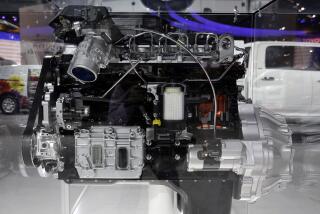Big Three Lose Round on Minivans : Trade: U.S. regulators rule that Detroit has not been injured by Japanese vehicles and thus no dumping penalties can be levied.
- Share via
DETROIT — The U.S. International Trade Commission dealt a surprise setback to the domestic auto industry Wednesday by ruling 4 to 2 that Detroit has not been injured by Japanese minivans, even if they are unfairly priced.
Earlier, the Commerce Department had declared that minivans imported by Toyota and Mazda were being dumped in this country at below-market prices and should be slapped with special tariffs.
But no dumping penalties can be levied unless the alleged victims--in this case Ford Motor Co., Chrysler Corp. and General Motors Corp.--can prove they were “materially injured” by the practice, a finding that the quasi-judicial ITC rejected.
Not only does the U.S. industry still control 88% of the minivan market, but the ground it did lose in the late 1980s stemmed from problems with its own products rather than Japanese pricing policies, commissioners said.
U.S. auto producers called the decision “incomprehensible” and said it was a blow to American workers because it sanctions threats to their jobs by illegal trade. Their Japanese competitors called it a victory for American consumers, because it will prevent a run-up in prices.
However, both claims may be overwrought. Sales of domestic minivans are climbing amid a recovering auto market, while prices of Japanese minivans and other vehicles have jumped sharply already. Some argue that the price hikes were a result of the dumping charges and protectionist threats.
When it was filed a year ago, the anti-dumping complaint marked the first time that Detroit’s Big Three auto firms had lined up on the same side of a trade issue. All three companies then were deeply in the red, the economy was stalled and Japanese-controlled auto production was eating away at the U.S. industry’s market share.
However, the case against minivans raised eyebrows from the start because it is the one part of the market where Japan has enjoyed little success. The minivan was invented in 1984 by Chrysler, which still controls 53% of the market. The GM and Ford entries have been less successful.
“From a sales standpoint, the domestics really haven’t been hurt,” said Chris Cedergren, a senior vice president at AutoPacific Group in Thousand Oaks, a market research and consulting firm. “Americans who want a compact van still perceive (Chrysler) as offering the best value in the class.”
But Detroit and its supporters argued that the damage from the alleged minivan dumping was in the form of reduced profits realized by the U.S. makers as a result of the downward price pressure created by the Japanese.
“You don’t have to lose market share to suffer injury,” said Clyde Prestowitz, a former Reagan Administration trade adviser whose Washington-based Economic Strategy Institute advocates relief for Detroit. “If they can force you to take less in profits on minivans when you’re losing money on the other cars you sell, they can cause severe competitive difficulties.’
Wednesday’s ruling ends the case unless it is appealed. A spokesman for the Motor Vehicle Manufacturers Assn., lobbyist for General Motors, Ford and Chrysler, said no decision had been made on whether to pursue the case.
But other initiatives continue. Detroit is known to be considering dumping charges against Japanese luxury cars. And on Wednesday, the House Ways and Means Committee voted to reclassify imported minivans and Jeep-style vehicles from cars to trucks, making them subject to the prevailing 25% truck tariff instead of the 2.5% car tariff.
Meanwhile, the climate has changed. New domestic products and a recovering economy, combined with Japan’s financial woes back home and the run-up in prices of Japanese vehicles, have begun to shift the momentum. In recent months, Detroit has been recapturing market share from Japanese-brand vehicles.
In any case, the ruling by the ITC--made of up three Republicans and three Democrats nominated by the White House and confirmed by the Senate--seemed to cut against the recent political sentiment in Washington to get tough with Japan on trade.
John Guinivan, a Washington-based spokesman for Chrysler, said Big Three lobbyists were shocked and angered by the ruling. He said the dumping case was filed after White House staffers “seemed receptive to our arguments and seemed to think we had a good case. We don’t feel we were led down a path, we’re just disappointed.”
But Walter E. Huizenga, president of an association of import dealers, said: “If Japanese dumping results in an 88% minivan market share for the Big Three, then that is the kind of dumping the Big Three need in the other market segments.”






